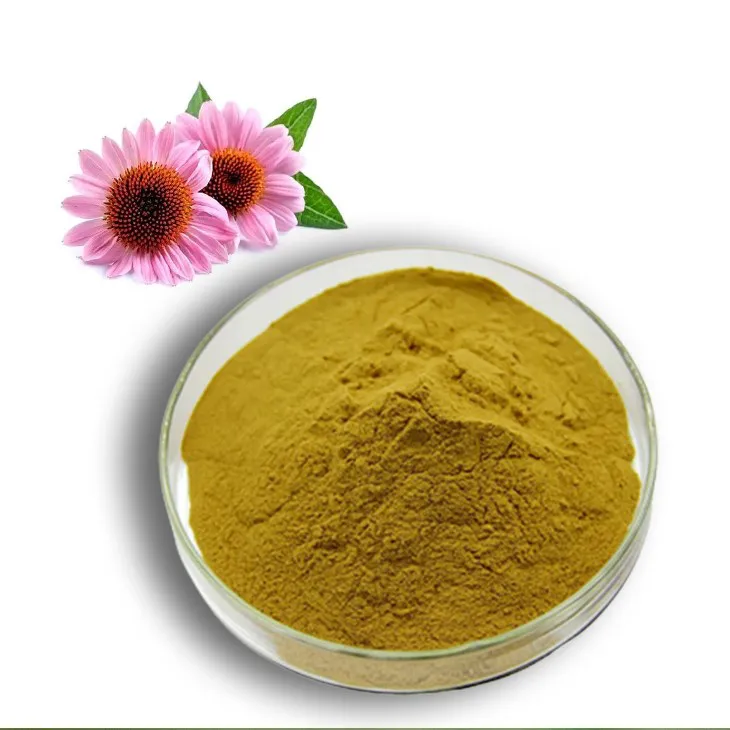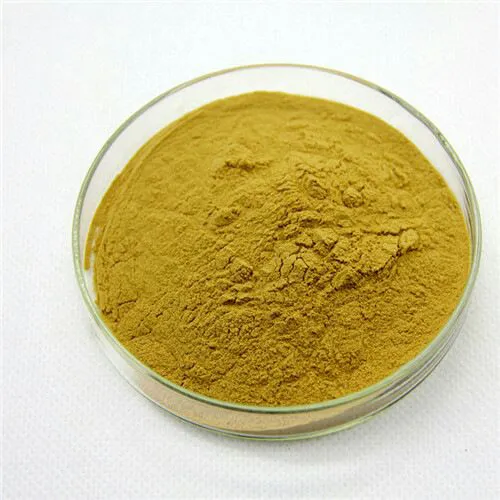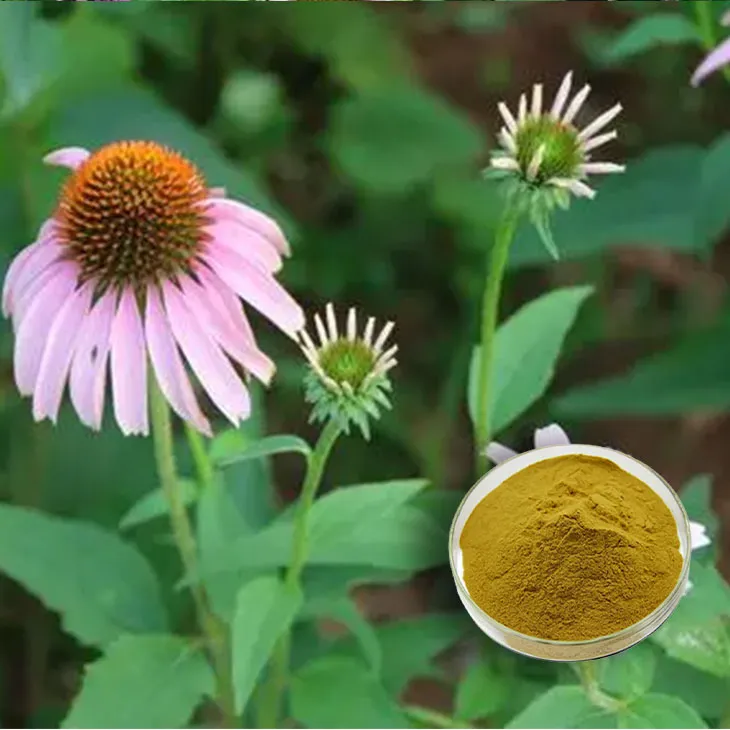- 0086-571-85302990
- sales@greenskybio.com
Mature Echinacea taste and natural Echinacea extract.
2024-11-12

The Sensory Experience of Mature Echinacea Taste
Echinacea, a remarkable plant in the botanical world, offers a distinct taste when it reaches maturity. The taste of mature echinacea can be described as a complex blend of flavors. It has a certain earthiness that is characteristic of many herbal plants. This earthy note is not overpowering but rather gives a sense of grounding, as if one is tasting a product directly from the soil in which it grew.
There is also a slightly bitter undertone to the taste. This bitterness is not the acrid kind that is off - putting, but rather a mild bitterness that adds depth to the overall flavor profile. It is similar to the bitterness found in some dark - leafy greens, which is often associated with the presence of beneficial compounds. In the case of echinacea, this bitterness may be related to its active phytochemicals.
Additionally, mature echinacea has a hint of floral aroma that translates into a delicate floral taste on the palate. This floral aspect is what sets it apart from other more purely bitter or earthy herbs. It gives a touch of elegance to the taste, making it more nuanced. When consumed, either in its raw form or as part of a preparation, this floral note lingers, leaving a pleasant aftertaste.

Uncovering the Secrets within Natural Echinacea Extract through Scientific Research
Scientific studies have delved deep into the composition of natural Echinacea Extract to uncover its many secrets. Echinacea contains a variety of active ingredients that contribute to its potential health benefits. One of the key components is polysaccharides. These complex carbohydrates play a significant role in modulating the immune system. Research has shown that they can stimulate the activity of immune cells, such as macrophages and lymphocytes, enhancing the body's ability to fight off infections.
Another important group of substances found in Echinacea Extract are the alkamides. Alkamides are known for their anti - inflammatory properties. They can help reduce inflammation in the body, which is crucial in various health conditions, from minor ailments like joint pain to more serious inflammatory diseases. By interacting with the body's inflammatory pathways, alkamides in echinacea extract can potentially provide relief and promote healing.
Flavonoids are also present in echinacea. These antioxidant - rich compounds are essential for protecting the body against oxidative stress. Oxidative stress is implicated in many diseases, including heart disease, cancer, and neurodegenerative disorders. The flavonoids in echinacea extract scavenge free radicals, reducing the damage they can cause to cells and tissues.

Bridging the Two Aspects: Taste and Extract
How Understanding the Taste Can Enhance Our Understanding of the Extract
The unique taste of mature echinacea can provide clues about the nature of its extract. For example, the earthy and bitter elements in the taste may be related to the presence of certain active ingredients. The earthiness could potentially be linked to the root - derived components of the extract, such as polysaccharides that are often concentrated in the roots. Understanding this connection can help researchers and herbalists better predict the quality and potency of the extract based on taste alone.
The floral aspect of the taste may also be associated with specific volatile compounds that are present in the extract. These volatile compounds could have their own set of biological activities, in addition to contributing to the overall taste. By analyzing the taste and correlating it with the chemical composition of the extract, we can gain a more comprehensive understanding of how echinacea functions at a physiological level.
How the Extract Can be Better Utilized in Different Industries Considering Taste and Active Ingredients
Herbal Medicine
In the field of herbal medicine, the natural echinacea extract is highly valued for its immune - enhancing and anti - inflammatory properties. However, the taste can also play a role in its utilization. For instance, when formulating herbal remedies, the bitterness of echinacea can be balanced with other sweet - tasting herbs to make the medicine more palatable. This not only improves patient compliance but also allows for a more effective dosing regimen.
Understanding the active ingredients in relation to the taste can also help in standardizing herbal preparations. Herbalists can use the taste as an additional parameter to ensure the quality and consistency of echinacea - based products. By ensuring that the taste profile remains consistent, they can be more confident in the potency of the active ingredients present in the extract.
Cosmetics
In the cosmetics industry, echinacea extract is being increasingly used for its antioxidant properties. The flavonoids in the extract can help protect the skin from environmental damage, such as UV radiation and pollution. However, the taste of echinacea can also be relevant in this context. Since the extract may be used in products that are applied topically, the potential aroma or taste - related compounds could have an impact on the overall sensory experience of the product.
For example, in facial creams or lotions, a pleasant, natural - smelling product is often preferred by consumers. By carefully considering the taste - related volatile compounds in echinacea extract, cosmetic formulators can create products that not only offer skin - protecting benefits but also have an appealing sensory profile. This can lead to increased consumer acceptance and better market performance for echinacea - based cosmetics.

FAQ:

What is the typical taste of mature Echinacea?
The taste of mature Echinacea can be described as somewhat earthy, with a slightly bitter undertone. It may also have a hint of floral or herbaceous notes. However, the taste can vary depending on factors such as the specific variety of Echinacea and the growing conditions.
How is the natural Echinacea extract obtained?
The natural Echinacea extract is typically obtained through processes such as solvent extraction. Different solvents like ethanol or water can be used to extract the active compounds from the Echinacea plant. After extraction, the resulting liquid is often further processed to concentrate the extract and remove any impurities.
What are the main active ingredients in the natural Echinacea extract?
The main active ingredients in Echinacea extract include alkamides, caffeic acid derivatives, and polysaccharides. These components are believed to contribute to the potential health - promoting properties of Echinacea, such as its immune - enhancing effects.
How can the understanding of the mature Echinacea taste help in the utilization of the extract in herbal medicine?
The taste of Echinacea can provide clues about its chemical composition. In herbal medicine, if a certain taste is associated with specific effects, it can guide the formulation of herbal remedies. For example, if the bitter taste is related to its immune - enhancing properties, it can be used in combination with other herbs to create more effective immune - boosting formulas. Additionally, the taste can affect patient compliance, so understanding it can help in formulating more palatable herbal preparations.
How can the natural Echinacea extract be used in cosmetics?
The natural Echinacea extract can be used in cosmetics due to its potential antioxidant and anti - inflammatory properties. It can be added to skincare products such as creams, lotions, and serums to help soothe the skin, reduce inflammation, and protect against environmental damage. The extract may also contribute to improving the overall texture and appearance of the skin.
Related literature
- Title: The Chemical Composition and Pharmacological Properties of Echinacea"
- Title: "Echinacea Extract in Cosmetics: A Review of its Efficacy and Safety"
- Title: "Taste and Bioactivity: Unraveling the Mysteries of Echinacea"
- ▶ Hesperidin
- ▶ Citrus Bioflavonoids
- ▶ Plant Extract
- ▶ lycopene
- ▶ Diosmin
- ▶ Grape seed extract
- ▶ Sea buckthorn Juice Powder
- ▶ Fruit Juice Powder
- ▶ Hops Extract
- ▶ Artichoke Extract
- ▶ Mushroom extract
- ▶ Astaxanthin
- ▶ Green Tea Extract
- ▶ Curcumin
- ▶ Horse Chestnut Extract
- ▶ Other Product
- ▶ Boswellia Serrata Extract
- ▶ Resveratrol
- ▶ Marigold Extract
- ▶ Grape Leaf Extract
- ▶ New Product
- ▶ Aminolevulinic acid
- ▶ Cranberry Extract
- ▶ Red Yeast Rice
- ▶ Red Wine Extract
-
Oyster Mushroom Extract Powder
2024-11-12
-
Jujube Extract
2024-11-12
-
Phyllanthus Emblica Extract
2024-11-12
-
Cat Claw Extract
2024-11-12
-
Hesperidin
2024-11-12
-
Bamboo Leaf extract
2024-11-12
-
Wheat Germ Extract
2024-11-12
-
Feverfew Extract
2024-11-12
-
Beta Carotene
2024-11-12
-
Eucommia Ulmoides Extract
2024-11-12





















